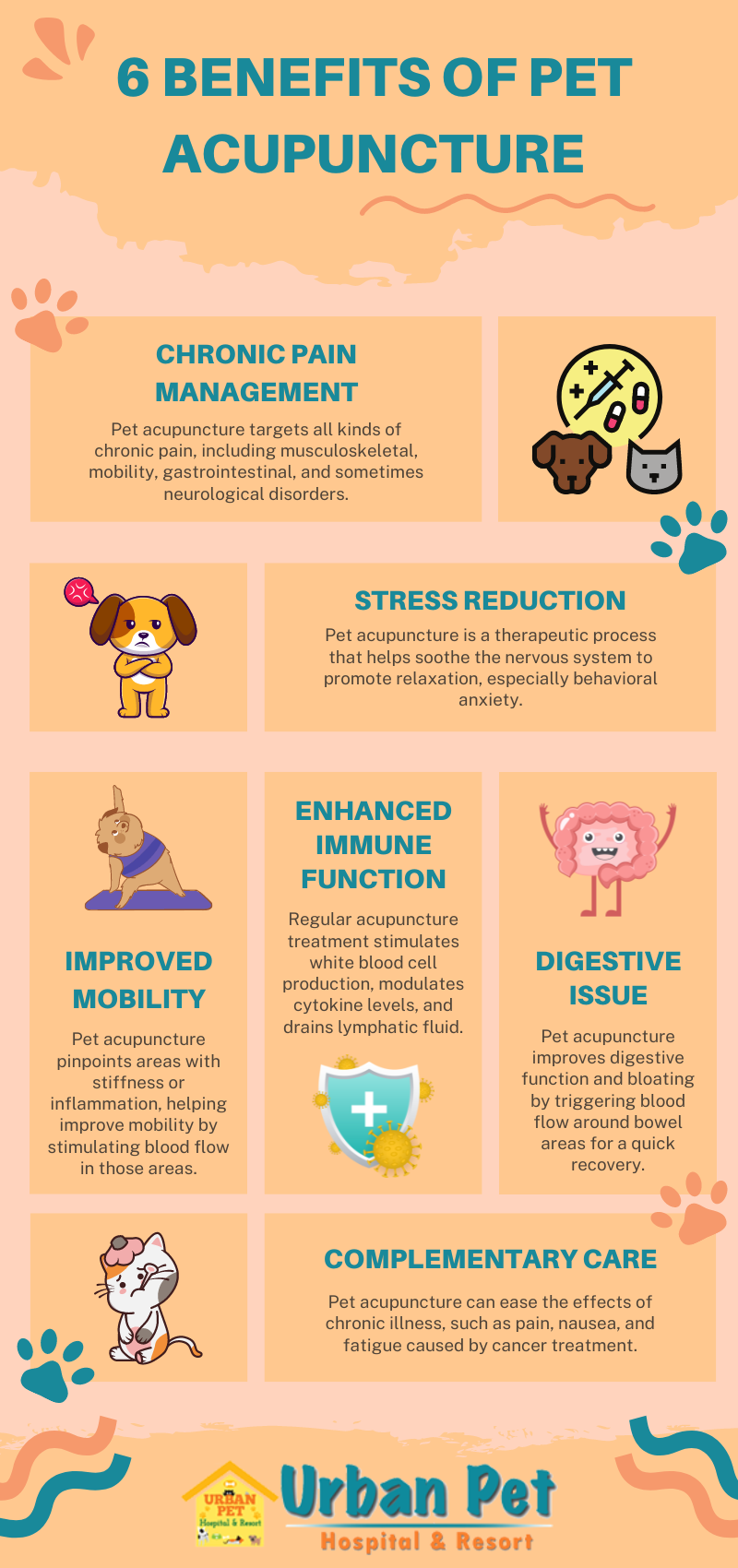Are you feeling bad seeing your furry buddy suffering from chronic pain, anxiety, and mobility issues? Then, it is time to seek a reliable treatment to offset their pain, which is acupuncture.
You heard it right: Pet acupuncture is a thing. Many pet owners confirmed that acupuncture treatment has helped their pet lower pain and improve mobility because of its varied therapeutic benefits, such as muscle relaxants, stress and mobility management, and improving digestive health.
Acupuncture has roots in ancient Asian medical traditions and has millions of followers worldwide.
Explore how your pet can benefit from acupuncture and whether you should take it as an alternative or a stand-alone therapy!
What is Pet Acupuncture?
Pet acupuncture is a holistic veterinary practice that involves the process of inserting thin needles into specific points on a pet’s body to promote healing.
Many vets will recommend pet acupuncture as an alternative therapy for needy pets because of its many benefits.
Do not worry about hurting your pet because the needles used are typically harmless and left in place for a short period. In fact, many pets enjoy the session as they sit relaxed throughout.
This alternative therapy is based on traditional Chinese medicine principles. It focuses on the body’s energy flow, or “qi,” along meridian pathways and restoring the natural balance.
Six Benefits of Acupuncture for Dogs and Cats
Pet acupuncture is especially beneficial for pain, including musculoskeletal, chronic, mobility, gastrointestinal, and sometimes neurological disorders.
Addressing these issues is more suitable with traditional veterinary medicine as it has no side effects.

Here is how your pet can benefit from acupuncture treatment.
1. Pain Management
Acupuncture is widely known for alleviating all kinds of pain in pets.
Whether your pet is dealing with chronic conditions such as arthritis or recovering from surgery, acupuncture can provide relief by triggering the release of endorphins, the body’s natural painkillers.
This drug-free approach is mainly beneficial for older pets experiencing age-related discomfort.
Common Types of Pain that Acupuncture Addresses
- Inflammation associated with arthritis and joint mobility.
- Strained or sprained muscles.
- Neuropathic conditions such as sciatica and post-surgical pain.
- Dental problems, such as toothaches or gum diseases.
- Soft tissue injuries, like tendon or ligament damage.
- Chronic back pain due to intervertebral disc.
- Pain from inflammatory conditions such as pancreatitis or bowel disease.
You should consult with the veterinarian about the frequency of acupuncture, as some chronic pain issues may require regular acupuncture treatments.
2. Stress Reduction
Like humans, animals can experience stress and fear due to changes in routine, weather, loud noises, or even vet visits, which can cause stress in our pets.
Acupuncture helps soothe their nervous system, reduce stress, and promote relaxation.
It can be especially beneficial for pets with behavioral issues or anxiety.
How Does Acupuncture Contribute to Stress Reduction?
- Acupuncture activates the parasympathetic system, inducing relaxation and reducing stress in pets.
- The endorphin release from needles alleviates pain and enhances overall well-being.
- It lowers cortisol levels, regulating the body’s stress response for calmness.
- Balances energy flow, addressing blockages that contribute to stress.
- It improves sleep quality by calming the nervous system in pets.
- It regulates mood and emotions through a positive influence on neurotransmitters.
- Enhanced circulation reduces muscle tension, promoting relaxation in pets.
3. Improved Mobility
Arthritis and other musculoskeletal conditions can make it difficult for your pet to move around, affecting their overall quality of life.
Pet acupuncture targets specific body points to stimulate blood flow and reduce joint inflammation, improving mobility.
It is even more beneficial for senior pets or those with orthopedic issues.
- It influences pain perception and motor function by adjusting neurochemical pathways.
- It Promotes local vasodilation and enhances the supply of oxygen and nutrients to musculoskeletal tissues.
- It regulates inflammatory processes, reducing swelling and supporting joint tissue repair.
- It boosts cortisol levels to alleviate stress-related stiffness.
- It improves proprioception and neuromuscular control for coordination and movement.
- It fosters an anti-inflammatory environment for joint health by influencing cytokine.
4. Enhanced Immune Function
A pet’s well-being relies on a robust immune system.
Maintaining a balanced immunity is crucial for pets for disease resistance, speedy recovery, and overall wellness.
Moreover, a healthy immune system improves vaccination effectiveness, defends against cancer, supports digestion, and ensures reproductive health.
Additionally, it helps adapt to environmental changes, promoting longevity and a high-quality life.
How Acupuncture Boosts Immunity
- It stimulates white blood cell production, strengthening the immune system.
- It regulates immune responses by modulating cytokine levels for optimal functioning.
- It enhances the circulation of lymphatic fluid, promoting efficient immune cell movement.
- It regulates the delicate balance between pro- and anti-inflammatory signals.
- It enhances organ function to promote a healthy environment for immune responses.

5. Digestive Health
Digestive issues are very common in pets and are not always considered emergencies. However, 34.8% of dogs suffer from gut problems like discomfort and malnutrition.
Acupuncture improves digestive function by stimulating the nerve system, increasing blood flow, decreasing inflammation, and altering immunological responses.
Moreover, it corrects imbalances through neuroendocrine modulation, stress reduction, and gut microbiota normalization, supporting overall digestive health in pets.
Common Types of Digestive Issues Acupuncture Addresses
- Irritable Bowel Syndrome (IBS)
- Gastrointestinal issues, including nausea and vomiting
- Inflammatory Bowel Disease (IBD)
- Constipation
- Diarrhea
- Colities
- Liver Disorders
- Bloating and Gas
6. Complementary Cancer Care
In cases of cancer treatment, acupuncture can ease the effects such as pain, nausea, and fatigue caused by chemotherapy and radiation.
It does not cure cancer but can improve the overall quality of life for pets undergoing cancer treatment.
Essential Considerations for Acupuncture in Pet Cancer Care
- Choose a veterinarian skilled in both oncology and acupuncture.
- Ensure a customized treatment plan that goes well with the pet’s cancer stage.
- Regularly monitor and adjust the treatment plan for optimal results.
- Create a calm environment for sessions while prioritizing the pet’s comfort.
- Maintain open communication with the vet to address concerns and progress.
- Understand costs, explore financial assistance, and have realistic expectations about outcomes.
Conclusion
Although acupuncture addresses many health issues, the result may vary depending on the specific condition and individual responses.
Always consult a qualified veterinarian or a certified veterinary acupuncturist to determine the suitability of acupuncture for your pet.
Contact Urban Pet Hospital and Resort, the best pet hospital in Des Moines, for pet acupuncture services.